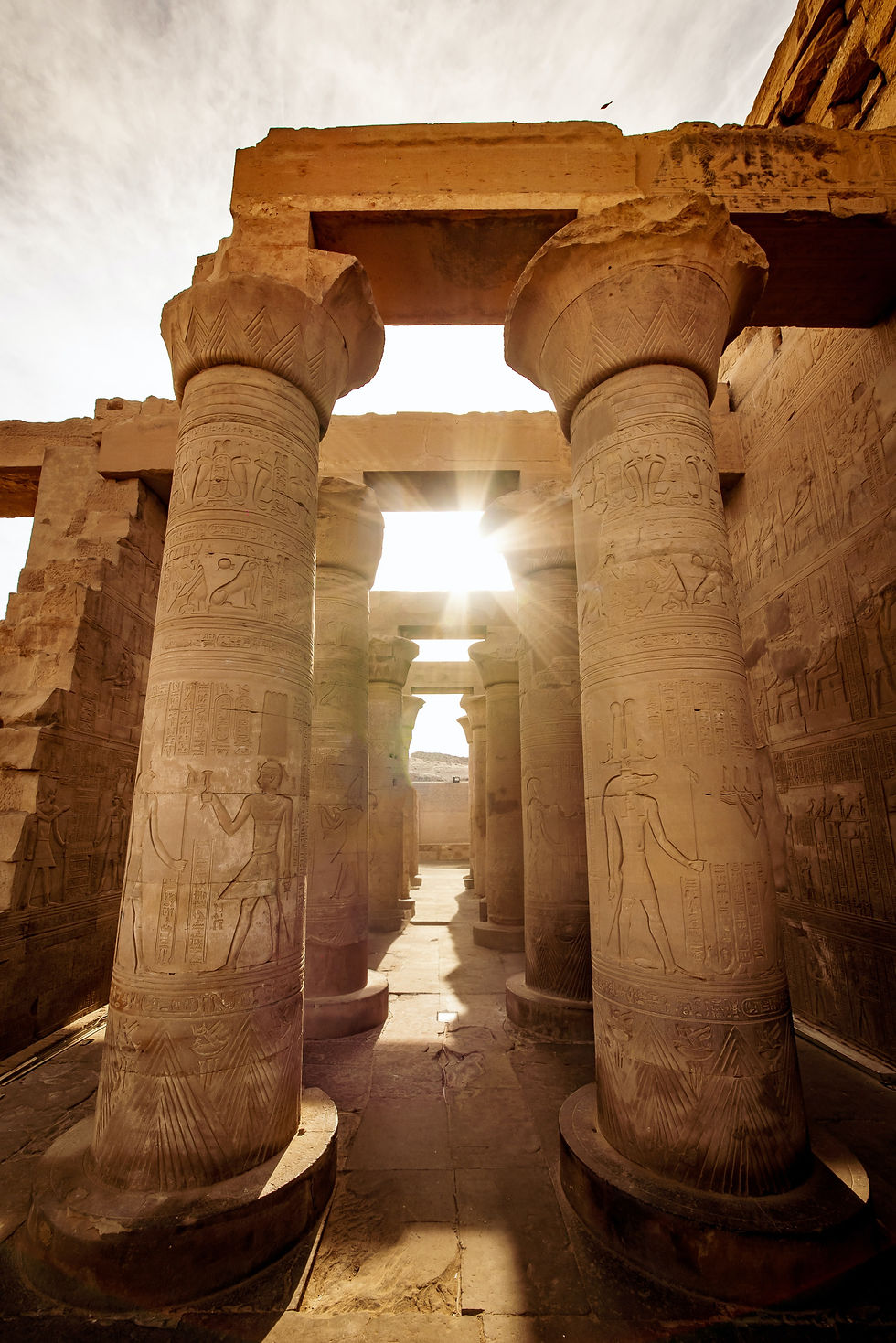The Providence of Pain: Joseph's Test, Part II
- cjoywarner

- Jun 28, 2025
- 6 min read
Updated: Aug 29, 2025

Without a doubt, Joseph's profound fear of God not only holds him steady through all his experiences as a slave in Egypt but also becomes the source of his wisdom, a wisdom so great that even Pharaoh stands in awe. But neither Joseph's fear of the Lord nor his wisdom begins in Egypt but traces far back into the traumatic events of his childhood. If we allow the stereotypes of Joseph's boyhood to overshadow the truth, we miss one of the most important events of his life that not only informed his view of pain but that formed his fear of God. That event is the untimely death of Joseph's mother. Rachel is certainly her own riddle, and if we read her life backwards--from her burial in Ephrath (Bethlehem) away from all the other patriarchs and their wives, including Leah; to her death while giving birth to Benjamin; to Jacob's curse of death pronounced on the one who stole Laban's gods; to her literal coverup in stealing those gods; to her frequent petulance with Jacob over her barrenness; to her unrivaled status as the apple of Jacob's eye--we see her beginnings as a beautiful young woman who knew that Jacob adored her.
Although Rachel's charm seems to have cast its spell for many years, Joseph learns from his mother's untimely death that no one stands outside the judgment of God. He also learns that feminine wiles ultimately prove deceitful and vain but that the woman who fears the Lord is to be praised. Sadly, we cannot remember Rachel as a woman who feared the Lord. Instead, she brought utterly unnecessary pain not only to those who loved her but especially to the God Who loves us. It would be difficult to imagine Jacob's pain at losing not only Rachel but his faith in Rachel. Without a doubt, Jacob learned that the love of his life upon which he placed the highest price was not worthy of selling his soul.
Joseph arguably discerns his father's struggles while carrying his own pain as a mere boy who needs his mother. Memories stained with his sister Dinah's tragic trauma and his brothers' savage and indecent behavior teach him the depravity of the human heart in harshly indelible terms. Joseph understands as almost no other Biblical character does that keeping one's soul pure is life's primary occupation, no matter the cost. The alternative is unthinkable--idolatry, rape, adultery, murder--there is enough drama in the Jacob household to fill several volumes, but it is Joseph's life that fills more chapters in Genesis than even Abraham's. Joseph seems to become the archetypal object lesson of pain management while keeping his heart with all diligence, for out of Joseph's heart come not only the "issues of life" but a living emblem of Christlikeness in a fallen world.
Joseph's relationship with his father is clearly symbolic of Christ's honor for His Father, and Joseph and Jacob likewise share a bond of pain throughout their lives that is at times almost too great to bear. No wonder young Joseph feels compelled to prevent his father further loss by reporting the sons of Bilhah and Zilpah's behavior. Far from being a "snitch," Joseph shepherds even his father's heart. The chief irony is that Joseph himself brings his father more pain than anything else that could have happened to Jacob, and we can be sure that Joseph's awareness of this fact compounds his own pain at separation. And yet Joseph does not wallow in any depth of pain, vicarious or personal. He keep his sanity by realizing--at least eventually--that this pain has served a divine purpose for others' good. How wonderful that Joseph is able to sense his Lord's nearness in all the years of separation from Jacob. The first mention in all of Scripture of the Lord being "with" someone occurs in the story of Joseph. The text says, "But the LORD was with Joseph" (Genesis 39:21), and this becomes the story of Joseph's life. Even when the Lord tests Joseph severely, He is with him, giving him the strength to make the right choices.
The minute Joseph lands in Egypt and is purchased by Potiphar, we read that "The LORD was with Joseph, and he was a successful man" (Genesis 39:2). Even Potiphar recognizes that the Lord has made all Joseph does to prosper in his hand, and, because of this, he trusts Joseph completely with everything in his house. A busy nod here and there is all Potiphar gives to this young man who knows his place under the fear of God. Not only does Joseph's immediate success under captivity disprove any ill-tempered critics' assumptions as to his being "spoiled," it proves quite the opposite. Joseph is no stranger to responsibility or to hard work, for he realizes that, just as he had once worked to honor his earthly father, now he works to bring glory to his Heavenly Father. If he has been called to be a slave, he will fulfill this role with the royalty due to his coat of many colors. With Hannah Whitall Smith, Joseph seems to know that there are no "second causes" but that his God has placed him exactly where he is. Clearly, Joseph passes not only the "spoiled" test but also the separation test and the slavery test.
When Potiphar's wife takes another look at Joseph--and another, and another--she attempts daily to wear him down in order to seduce him. Joseph is young, strong, and handsome, but he doesn't seem to know this. With none of his mother's apparent vanity, he goes about his way, quietly and logically resisting Potiphar's wife. His repeated reply could become the epitaph of his entire life, "How can I do this great wickedness, and sin against God?" (Genesis 39:9). But Mrs. Potiphar's lust knows no logic, and the day arrives that she latches onto Joseph with one more persistent command, "Lie with me." This time Joseph answers with his feet and leaves his garment in her hand. Not realizing that this garment, like his coat of many colors, will be used as evidence to create "fake news," Joseph nevertheless stands guiltless before Potiphar when he finds how Potiphar's wife has slandered him--in one of the clearest examples of "gaslighting" in Scripture. But telling the exact opposite of what happened will not change the fact that Joseph has passed the sexual purity test and that he will also pass the slander test.
If ever there would have been a perfect time to "snitch," this would have been it. But Joseph is a gentleman through and through, and he holds his peace. Literary critics have said that it is difficult to make a good character interesting, but Joseph is a superhero who makes a "King David" look pretty bad. So, here comes another reversal, just when things were going so well with Potiphar's favor. But once again, we read, "But the LORD was with Joseph and showed him mercy, and he gave him favor in the sight of the keeper of the prison" (Genesis 39:21). And Joseph is put in charge of all the other prisoners. So, the slave who becomes a prince of a slave now becomes a prisoner entrusted with all other prisoners. Joseph wouldn't make a very good criminal by this estimation. He is too good. But Joseph is the freest he has ever been when rubbing elbows with the other inmates because he has a clear conscience and knows that God is with him. His fear of the Lord has not deserted him even one time, and the Lord of his fear has never left his side.
In none of these trials do we ever hear of Joseph complaining of his fate. Still, he is kept human before us, for Moses narrates a bit of his suppressed pain when he tells how Joseph asked the baker and the butler, whose dreams he has correctly interpreted, to remember him when they return to Pharaoh. The baker, of course, is released from prison only to be executed, but the butler forgets all about Joseph. Two more dark and grimy years pass, and yet Joseph still stands out as the star in the inky night. Why does he even go on? He has lost his reputation, his station, his family, and even, it would appear, his dreams, and yet in interpreting others' dreams, he has ironically fulfilled his own, for the day awaited finally comes, and Joseph is summoned to Pharaoh. With humility and ease, Joseph interprets the dreams of the seven years of plenty followed by seven years of famine. His entire life has seemed to be a picture of this dream, with the feast of his father's love followed by the famine of anyone else's love thereafter. And yet with conviction and a ring of reality, Joseph can tell Pharaoh what is to come.
On the spot, Joseph is released and promoted as second in command under Pharaoh. He is given a signet ring, and the Egyptians bow to him in the chariot as he rides through the streets. Was this his dream--to be bowed to and praised? No. His dream is to attain the wisdom that fearing the Lord brings, and to this wisdom an entire nation now bows. Little does Joseph know that his life will serve as a metaphor of the Christ before Whom every knee shall one day bow (Philippians 2:10-11). To the truth of this metaphor, one group yet remains who must bow before the Lord's wisdom as seen in Joseph's life--his ten wicked brothers. Nine more years will pass before Joseph will see their faces. On that day, the locked treasure chest of Joseph's dreams, placed before him so many years ago, will indeed spring wide open when the Providence of pain at last hands him wisdom's key.



I really like this parallel you point out about Joseph’s garments: “Not realizing that this garment, like his coat of many colors, will be used as evidence to create "fake news," Joseph nevertheless stands guiltless before Potiphar when he finds how Potiphar's wife has slandered him…” I had never really thought to connect the two before!